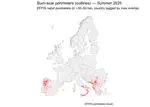Hi !
I’m a development economist in training at CERDI. I spend most of my time debugging my R and Python codes trying to understand where “climate money” goes, what it is for, what it changes locally, and how data and ML can help answer these questions.
Interests
- Development economics
- Climate finance
- Geocoded and spatial data analysis
- Machine learning & causal inference
Education
PhD Candidate in Development Economics, 2023
Clermont Auvergne University
Master degree in development economics, with honours, 2021
Clermont Auvergne University
Bachelor degree in development economics, with honours, 2018
Clermont Auvergne University
Experience
PhD student
Responsibilities include:
- Conducting empirical research on climate finance
- Developing causal-inference strategies (DiD, event studies, double machine learning) to evaluate the effects of climate policies such as National Adaptation Plans
- Building and maintaining reproducible data and code pipelines in R and Python
- Contributing to teaching in econometrics and quantitative methods
Research assistant
Development economics, international development finance.
Recent News
Contact
I am happy to discuss research, teaching, and potential collaborations. The best way to reach me is by email.
- pierre.beaucoral@uca.fr
- 26 Léon Blum Avenue, Clermont-Ferrand, Auvergne Rhône-Alpes 63000
- Floor 4
- DM Me



